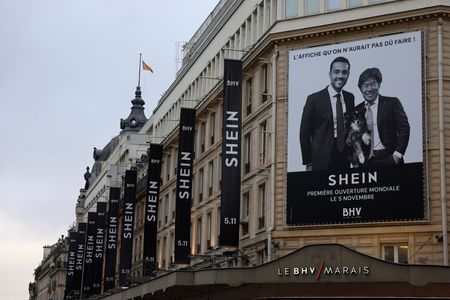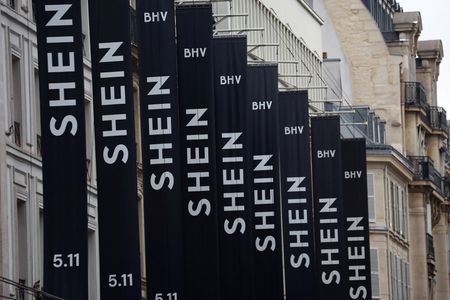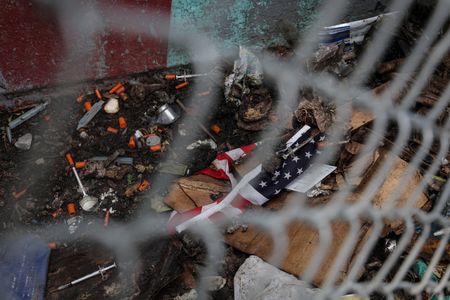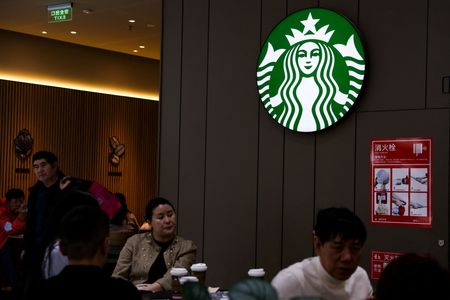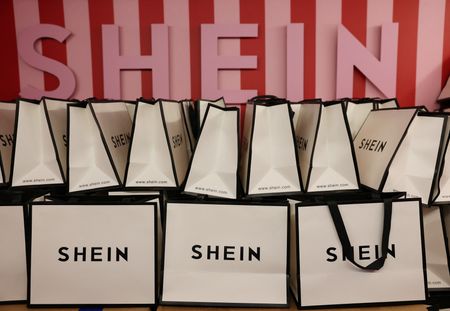By Helen Reid
LONDON (Reuters) -French politicians are escalating their fight with Chinese online fast-fashion retailer Shein, threatening a ban over childlike sex dolls on its site, just as the company plans to open its first-ever permanent shop in Paris.
After France’s consumer watchdog found sex dolls resembling children for sale on Shein’s platform, finance minister Roland Lescure threatened on Monday to block Shein’s access to the French market if it ever sold such dolls again.
Shein said it had sanctioned the sellers and implemented a ban on sex dolls. The Paris prosecutor’s office said on Tuesday it was investigating online retail platforms Shein, Temu, AliExpress and Wish over alleged dissemination of contents including child pornography on their marketplaces.
Shein, one of the world’s biggest fast-fashion retailers, had already sparked anger among French politicians and retailers over its low-cost business model and, most recently, its plans for the concession outlet set to open on Wednesday in Paris department store BHV. Other outlets will open later in Galeries Lafayette department stores in five regional cities.
On hearing of the Shein shops, Véronique Louwagie, France’s commerce and small business minister until September, began organising against them.
She phoned the president of Galeries Lafayette, the mayors of Angers, Dijon, Grenoble, Limoges, and Reims, where the Shein outlets are planned, and the head of French public bank Caisse des Dépots, which was meant to fund a BHV real estate deal, she told Reuters.
The campaign illustrates the coordinated effort by French politicians, retailers and regulators to oppose Shein’s expansion and protect high street retailers, ahead of tough new legislation on online platforms which Shein has fought against.
SHEIN ‘DESTROYS SHOPS’
French lawmakers say Shein’s rapid growth is driven by an unfair advantage: a customs duty exemption on low-value ecommerce packages that allows it to sell at rock-bottom prices. Meanwhile, French fast-fashion chains like Jennyfer and Naf Naf have gone into bankruptcy.
“Shein impacts the vitality of our regions, destroys jobs and destroys shops,” Louwagie told Reuters.
Shein argues its “on-demand” business model, with factories making small batches before ramping up if a product sells well, is more efficient, and that its online marketplace can help French brands and retailers reach more customers.
Shein was approached to set up the French outlets by Société des Grands Magasins (SGM), which has been trying to turn around the struggling BHV and regional Galeries Lafayette department stores and hopes the launch will attract a younger clientele.
Galeries Lafayette, however, said last month that the Shein concession stores would go against its values, and on Tuesday said it had agreed with SGM to end their franchise agreement – meaning the regional department stores will no longer carry the Galeries Lafayette name.
SGM has yet to decide on a new name for the five former Galeries Lafayette stores, a spokesperson said.
“We believe in Shein’s project,” said Karl-Stéphane Cottendin, general director at SGM, in an interview with BFM TV on Monday. “There’s some controversy surrounding it, but we also have a brand (Shein) with 24-25 million consumers in France.”
SGM and Shein seemed to embrace the controversy.
A billboard unveiled on Saturday above the BHV store in Paris’ Marais district featured a photo of SGM President Frédéric Merlin alongside Shein’s executive chairman Donald Tang and his dog Satchi, under the tagline: “The billboard we shouldn’t have made!”
“Creating a buzz is a way of doing business today, a more modern kind of business,” said Cottendin.
Shein has been trying to win trust in France.
It hired French leaders including former interior minister Christophe Castaner as advisors, and sought to strike deals with French retailers, while Tang has travelled around the country, met critics and attended gatherings of the French elite, but failed to turn the tide of criticism.
SHEIN FIGHTS BACK
France has been more robust than many countries in its policing of Shein, which was founded in China in 2012 and is seeking to go public in Hong Kong after failed attempts to list in New York and in London.
French regulators have hit Shein with fines over misleading discounts and collecting consumers’ data without consent, for a total of 190 million euros ($221.58 million) – more than any other country.
And under a planned law to rein in fast fashion, Shein could be banned from advertising in France and face penalties on each item it sells. The law, passed by the French Senate in June, is being revised by lawmakers to comply with EU law and could be implemented early next year.
The law specifically targets platforms that add more than 1,000 new items each day, like Shein and its rival Temu. Shein says the legislation would hurt consumers by making its products more expensive.
Shein is continuing to lobby against the law. On October 27, Tang for the first time wrote to lawmaker Anne-Cécile Violland, who spearheaded the bill, to ask for a meeting, according to a letter seen by Reuters.
FRENCH STORES A ‘VERY SMALL-SCALE TRIAL’
Shein’s stores are a “very small-scale trial”, a Shein spokesperson told Reuters, rather than a broader shift into physical retail outlets.
Its gamble is that the stores can draw crowds and have a positive economic impact, giving it ammunition against critics.
Shein said the stores would create 200 jobs overall and help the local economy, pointing to a pop-up in Dijon in June it said drew 27,000 visitors, more than half of whom visited the city centre especially.
But its BHV opening has prompted more than 20 brands to cut ties with the department store, while Disneyland Paris has cancelled a planned Christmas window display and store workers staged a protest. The Caisse des Dépots pulled out of an SGM-led deal to purchase the BHV building, saying its investments are based on values of promoting local and responsible business.
French retailers that have partnered with Shein have also faced backlash. In September, Shein announced a “Shein Xcelerator” deal with French fast-fashion firm Pimkie, putting the brand on its online marketplace.
Two days later, retail industry body Fédération des Enseignes de l’Habillement – whose members include French retailers Kiabi and Celio, and fast-fashion giants Zara and H&M – announced it was kicking Pimkie out.
CONCERNS ABOUT CHINESE DUMPING
France has pushed for faster action from the EU in scrapping its customs exemption on ecommerce packages under 150 euros, as concern grows that cheap Chinese products are being dumped in the market and customs are unable to properly check for compliance with EU law.
At a time when French politicians agree on very little, scrutiny of Shein has been a constant through several changes of government.
Louwagie’s successor as commerce and small business minister, Serge Papin, told lawmakers last month that defending high street retailers is “the priority for my ministry”.
“These platforms are dumping, they do not respect our values and they do not care about our ecological ambitions,” he said. “We are going to mobilise all together to defend ourselves.”
($1 = 0.8575 euros)
(Reporting by Helen Reid; Additional reporting by Inti Landauro and Alessandro Parodi; Editing by Susan Fenton)




